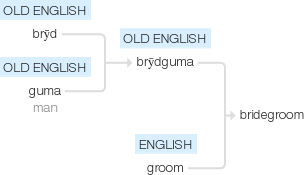Bridegroom
Old English brȳdguma, from brȳd ‘bride’ + guma ‘man’. The change in the second syllable was due to association with groom.
wiktionary
From Middle English brydgrome, bridegome, from Old English brȳdguma, from Proto-Germanic *brūdigumô; equivalent to Old English brȳd(“bride”) + guma(“man”). Altered by folk etymology to end with groom, as guma was obsolete. Compare Saterland Frisian Brüüdicham, Dutch bruidegom, German Bräutigam, Norwegian and Danish brudgom.
etymonline
bridegroom (n.)
"man newly married or about to be," Old English brydguma "suitor," from bryd "bride" (see bride) + guma "man," from Proto-Germanic *gumon- (source also of Old Norse gumi, Old High German gomo), literally "earthling, earthly being," as opposed to the gods, from suffixed form of PIE root *dhghem- "earth." Ending altered 16c. by folk etymology after groom (n.) "groom, boy, lad" (q.v.).
A common Germanic compound (compare Old Saxon brudigumo, Old Norse bruðgumi, Old High German brutigomo, German Bräutigam), except in Gothic, which used bruþsfaþs, literally "bride's lord."
